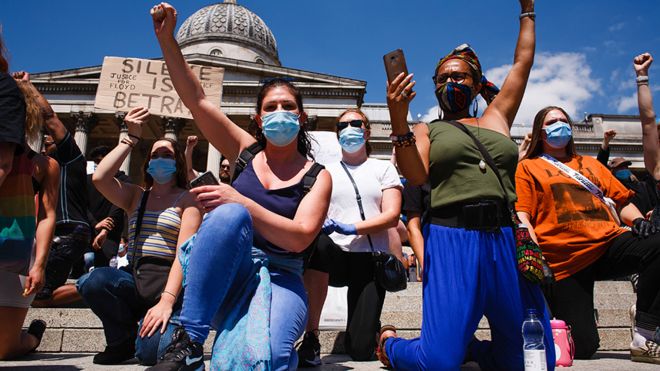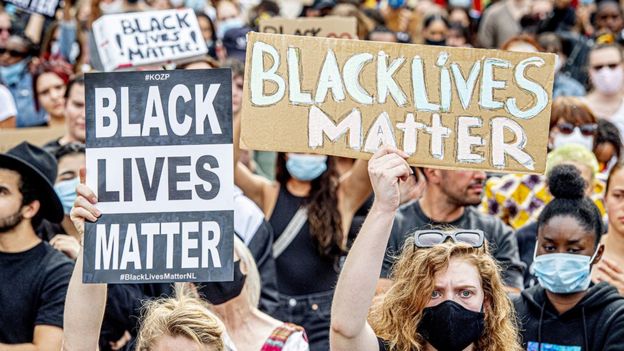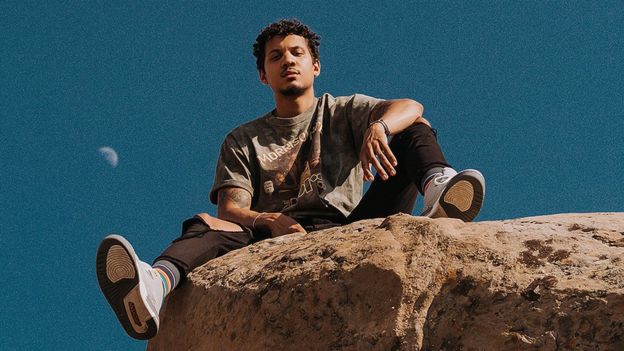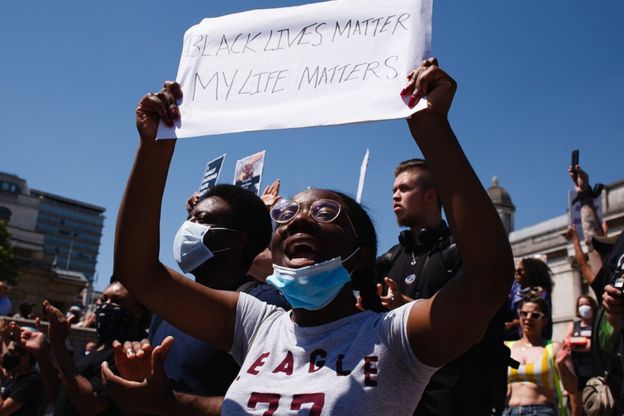- 6 June 2020BBC
 Getty Images
Ally. All lives matter. White privilege.These are just a few of the words and phrases you may have seen or heard in discussions about racial inequality after the death of George Floyd.Many of these terms about race and activism are controversial - and people often have different ideas about what certain phrases mean. Their life experiences will also affect how they define them. So Radio 1 Newsbeat's been chatting with a couple of people for their interpretations and perspectives.Kehinde Andrews is professor of black studies at Birmingham City University, director of the Centre for Critical Social Research, founder of the Organisation of Black Unity, and co-chair of the Black Studies Association. JT Flowers is a 26-year-old American rapper, student and activist living in the UK.
Getty Images
Ally. All lives matter. White privilege.These are just a few of the words and phrases you may have seen or heard in discussions about racial inequality after the death of George Floyd.Many of these terms about race and activism are controversial - and people often have different ideas about what certain phrases mean. Their life experiences will also affect how they define them. So Radio 1 Newsbeat's been chatting with a couple of people for their interpretations and perspectives.Kehinde Andrews is professor of black studies at Birmingham City University, director of the Centre for Critical Social Research, founder of the Organisation of Black Unity, and co-chair of the Black Studies Association. JT Flowers is a 26-year-old American rapper, student and activist living in the UK.White privilege
White privilege - a term some find upsetting and offensive - refers to the concept that people have basic rights and benefits simply because they are white. It doesn't mean they haven't suffered hardship or that they don't have a tough life - just that their colour hasn't made it harder.JT feels some people get defensive about this term because it's misunderstood."You might be a white person and still be poor with a lack of access to education or face a language barrier in the workplace. It doesn't mean you can't be disadvantaged in other ways," he tells Newsbeat. "It just means with respect to that one particular thing - your race and skin colour - you do have the luxury of not being able to think about it."It means having the luxury of being able to step outside without fearing that you're going to be discriminated against or oppressed in any way because of the colour of your skin," he says.The most recent statistics from the Home Office and Ministry of Justice show:- In 2018-19, black people were more than nine times as likely to be stopped and searched by police as white people.
- They were over three times as likely to be arrested as white people.
- They were more than five times as likely to have force used against them by police as white people.
- A quarter of the prison population comes from BAME backgrounds, despite representing just 14% of the population. In young offenders institutions, this increases to 50%.
Kehinde believes the benefits of whiteness can be "psychological" and that "there is a benefit to being white because you're not treated in the same way.""There are different dimensions to it, some people have more privilege."Kehinde tells us the phrase "white privilege" was first written by the famous black civil rights activist William Du Bois in the 1930s to explain the way white workers in America benefited from segregation and the colour of their skin.Many argue black people have to deal with an extra burden of worrying about how they will be treated because of how people perceive them. Speaking in a special show on BBC Radio 1Xtra, DJ Ace said as a "huge black man with a beard" people find him "frightening"."I have to live with this all day, every day and in every scenario."I'm aware my aesthetic is scary to some white people. Sometimes I might 'tone it down' and that embarrasses me"."If I see a white woman coming down the street I might cross so she feels more comfortable." Getty Images
Getty Images
Slogans like these were seen at protests, but more have been seen online White saviour
White saviour is usually used to describe somebody who appears to think certain communities '"need saving"."It is a concept that's rooted in this idea that marginalised communities, particularly the black community, isn't empowered enough to liberate themselves," says JT.He says in online spaces and activism it's usually used to point out when someone "takes it upon themselves to speak on behalf of black people or marginalised people," sometimes without understanding the circumstances.JT says ideally people should "create space for black people to speak for themselves".Last year, Stacey Dooley was criticised for making a film in Uganda for Comic Relief, and posting a picture on Instagram of her with a black child.At the time, MP David Lammy said: "The world does not need any more white saviours". Stacey Dooley insisted there was "nothing sinister" about what she did - and has since said she wouldn't change what she did.Following the row, Comic Relief's co-founder, the writer and director Richard Curtis, said the charity would use fewer celebrities in their films and be "very careful to give voices to people" who live in the areas being highlighted.Ally / allyship
At first glance, this seems a contradiction to "white saviour".JT describes an ally as "a person who's willing to stick their neck out and stand up for what's right when they see something going wrong".Often, this is someone who is outside of the community they are trying to help - so in this case, it might be white people who want to support the black community."It's what can white people do?" says Kehinde.JT believes an ally needs to do more than act like a "white saviour" and "take on some risk and bear the cost of actually standing up for justice"."What we're trying to do in the States is push the dialogue to a place where people begin to consider what it would look like to be an accomplice.He believes the best way to be an accomplice is to "create space for black people to speak for themselves." JT
JT
JT says it's not enough to be an ally, people need to be an "accomplice" All Lives MatterThis is often used as a response to the phrase "black lives matter' - the feeling from some people that all lives should be included in the conversation around race.JT believes people who say it may not understand what the "black lives matter" phrase means."Imagine your house is on fire and somebody comes up to you and says, 'Hey all houses matter.'"Your response would be along the lines of, 'Yes but your house isn't on fire so if all houses matter and your house is fine, then why is it so much to ask you to care when my house is burning down?'"JT believes we live in a society where - at present, "black lives aren't valued in the same way that white lives are." Getty Images
Getty Images
Thousands of people turned out to protest against racism in London, Manchester and Cardiff Silence = ViolenceAgain a controversial phrase which basically means the best way to address an issue is to speak about it - and staying quiet means you agree with what's going on."It's effectively just the idea that the status quo, our everyday reality at present, is a violent one for black people," claims JT."Refusing or failing to speak out on that is to be ok with things as they are."You don't have to post something on social media in order to act and live your life in an anti-racist way. If you see something going wrong on a street, you can speak up and do something."JT realises many people can feel uncomfortable on speaking out or may feel it's not their place."If you notice that you feel unequipped to have conversations with people about race, you can take the time to educate yourself.And speaking out doesn't have to mean posting on social media it can simply be about starting to talk honestly about race with those closest to you."You can have conversations with your friends and family members."
Sunday, 7 June 2020
George Floyd protests: What do 'white privilege' and 'ally' mean?
Newsbeat
Subscribe to:
Post Comments (Atom)
No comments:
Post a Comment